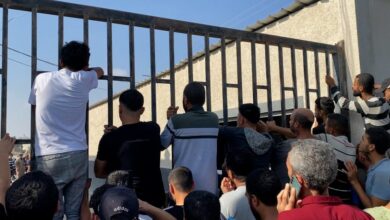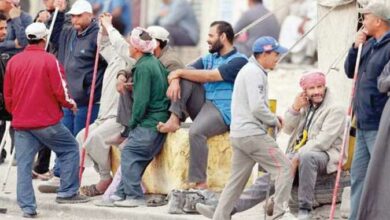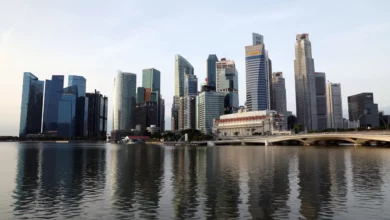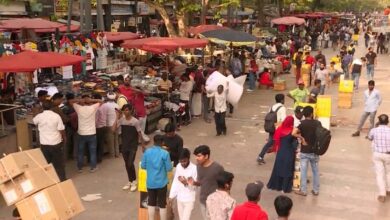After weeks of preparation for a strike at the Misr Spinning and Weaving Company in the Cairo industrial district of Mahalla el-Kubra, nothing happened. But why?
Walking through the company at eight in the morning this Sunday, every worker was in place as if the idea of a strike had never existed. The outward calm, however, did little to alleviate the expressions of fear and anxiety on the faces of managers and security officers.
Speaking in the corridors, they kept repeating, “All is well and no, there is no strike.” They assured that the workers are satisfied, having received several new benefits packages over the past two years. In short, there was no reason to strike.
Ahead of the scheduled strike action this week, company executive manager Fouad Hassan agreed to an increase in wages. “He passed by and calmed the workers, and gave money to the leaders of the strike last night,” said the wife of a worker at the company, who wished to remain anonymous.
Worker activists at the factory told Al-Masry Al-Youm that the executive manager promised a LE30 increase in the meal allowance by next January, raising the allowance to LE120.
And while workers agreed to call off the strike, doubts remain as to whether all is well. “I bet he will not pay this increase,” said Wael Habib, an activist with the independent Textile Workers League at the company.
At the same time as the increase was promised, Faysal Laqousha, one of the factory labor leaders, was called by the police for investigation on Sunday. “I was arrested on Sunday and kept as a guest of honor until the expected time of the strike was over,” said Laqousha, who has worked at the company for 18 years.
The company’s management officials interviewed by Al-Masry Al-Youm were quick to say workers might not be as willing to mobilize as they had been in previous years. “We have 23,000 employees who care about nothing more than earning their salary. And the majority of their demands were met after the recent strikes,” claimed an administrator, who did not wish his name to be given.
A wave of strike action shook Mahalla in 2006 and 2007. Workers succeeded in pushing an increase in bonuses under profit-sharing agreements from 89 to 135 days of wages, and the meal allowance increased from LE40 to LE90. The labor activists in the company have been subject to a series of crackdowns. The textile mill, the largest in the region, was occupied by police troops on 6 April 2008 to abort a planned strike over minimum wage. The strike leaders were detained, and troops put down demonstrations in the town, killing three citizens. Attempts to reorganize industrial actions have been met with administrative penal measures, and labor leaders are regularly summoned for interrogations at the local State Security police offices.
However, shop floor action remains a possibility because, after all has been said and done, workers perceive a vested interest in protecting the company from privatization. Ghazl el-Mahalla textile company, established in 1927, is the biggest of its kind in Egypt with a production capacity of 5.1 million ready-made swaths of cloth per year. “Last year our company’s losses reached LE144,000 million and this years’ losses have reached LE135,000 million,” said Kamal el-Fayoumi, a worker activist at the company.
He claims that the CEO insists on making losses year after year so that the company will be privatized a couple of years from now. “The year before he arrived, in 2007, we made LE105,000 million in profits, so the loss isn’t our fault,” el-Fayoumi told Al-Masry Al-Youm. “We are protecting our company,” he added.
Administrators claim that the workers who were transferred in 2008 – after having organized the protest of 31 October of the same year, at their respective branches – are behind the call for strike. “This is all a result of pressure from the four or five workers who were transferred from other branches,” charged Ismail Mahmoud, head of company security. “[For example, Mohamed] el-Attar was making many problems, so he was sent to another branch,” added Mahmoud.
Mahalla workers have a history of labour activism and in recent history the industrial district’s name has become synonymous with successful collective action. What is on everyone’s mind now, is whether this last failure to rally signals an end to the wave of strike action, or if it rather signifies a calm before the storm?




